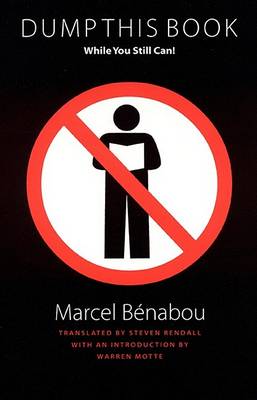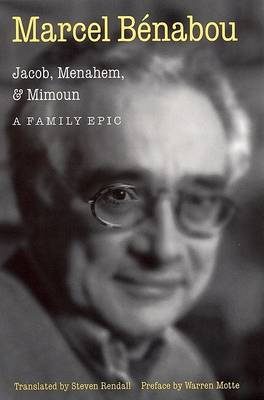Stages
2 total works
In one of the most thought-provoking and wry books by one of the most intriguing contemporary writers in French literature, readers become party to the dilemma of 'challenging' literature in a singularly involving and amusing fashion. Opening a book that has mysteriously appeared amid the clutter of his desk, the narrator finds himself exhorted not to read further, to throw the book away! Instead (but of course) he tries different strategies for approaching the book, none of which work. The narrator's tempestuous, increasingly obsessive relationship with the book he is determined to read, interwoven with the story of a real (but no less enigmatic) love affair, is, in its own challenging way, a charmed and charming, deeply provocative meditation upon reading and writing, and their inevitable discontents. "Dump This Book" offers a new angle on the work of this original writer and an ironic perspective on the power of reading to produce meaning. Marcel Benabou, author of more than a dozen books, lives in Paris and pursues his current positions as professor of ancient history at the University of Paris and as the permanent provisional secretary of Oulipo.
His "Jacob, Menahem, and Mimoun" (Nebraska 1998) won the National Jewish Book Award for autobiography. Steven Rendall is the author of "Distinguo: Reading Montaigne Differently" and has translated numerous books. Warren Motte, a professor of French at the University of Colorado, is the translator and editor of "Oulipo: A Primer of Potential Literature" (Nebraska 1986) and "Playtexts: Ludics in Contemporary Literature" (Nebraska 1995).
His "Jacob, Menahem, and Mimoun" (Nebraska 1998) won the National Jewish Book Award for autobiography. Steven Rendall is the author of "Distinguo: Reading Montaigne Differently" and has translated numerous books. Warren Motte, a professor of French at the University of Colorado, is the translator and editor of "Oulipo: A Primer of Potential Literature" (Nebraska 1986) and "Playtexts: Ludics in Contemporary Literature" (Nebraska 1995).
This title is the 1998 National Jewish Book Award Winner for Autobiography/Memoir. "A dry wit and surprising pathos infuse this "family epic," which turns out to be "merely" the telling of Benabou's failed attempt at creating his literary masterpiece...The reader shares his initial hopefulness as he details his younger self's ambitious plans for a family epic, founded in memory, supplemented by ever-growing mountains of scholarly documentation ...and formally grounded in a literary model of the past that, ultimately, eludes him. In telling the stories of his three selected ancestors, Jacob, Menahem, and Mimoun, Benabou notices that his youthful project has not disappeared. He's decided to let his book tell itself; he'll merely hitch himself to the story and go along for the ride in this artistic tour-de force, by turns playful and serious." - "Kirkus Reviews" Jacob, Menahem, and Mimoun delves into Marcel Benabou's uncommon family history while reflecting on the mysteries of memory, the past, and writing. Born in Morocco in 1939 to a Jewish family, Benabou left his home at age seventeen to study ancient history in Paris.
Benabou's memoir returns to his childhood in Morocco-to his parents, their home, and the Jewish community in Meknes. At the same time he accounts for all that has changed, including his very different life in Paris and the disappearance of the world of his childhood. He notes how he has turned from his family's wish that he become a rabbi to his absorption, as an adult, in several millennia of secular literature. And he worries about how his "family epic" - an epic meant to include the history of Morocco's Jews - has become a book about himself and his inability to write the great book he has long imagined - the book one owes oneself and the world. The impossibility of fully recovering the past hovers over his memories. And the impossibility of writing a book about that past is also there-an impossibility that Benabou acknowledges, delineates, and, in a real if also provisional sense, transcends. In his inspired attention to that impossibility, Benabou has written a book that transforms absence into presence and the past into rich matter for the present.
Marcel Benabou lives in Paris and pursues his current positions as professor at the University of Paris and as the permanent provisional secretary of Oulipo, that unsettling association of indefatigably innovative writers. Steven Rendall is a professor in the Department of Romance Languages at the University of Oregon. He is the author of "Distinguo: Reading Montaigne Differently" and the translator of many books including Jurgen Habermas's "Berlin Republic" (Nebraska 1997). Warren Motte is a professor of French at the University of Colorado. He is the author of several books including "Playtexts: Ludics in Contemporay Literature" (Nebraska 1995).
Benabou's memoir returns to his childhood in Morocco-to his parents, their home, and the Jewish community in Meknes. At the same time he accounts for all that has changed, including his very different life in Paris and the disappearance of the world of his childhood. He notes how he has turned from his family's wish that he become a rabbi to his absorption, as an adult, in several millennia of secular literature. And he worries about how his "family epic" - an epic meant to include the history of Morocco's Jews - has become a book about himself and his inability to write the great book he has long imagined - the book one owes oneself and the world. The impossibility of fully recovering the past hovers over his memories. And the impossibility of writing a book about that past is also there-an impossibility that Benabou acknowledges, delineates, and, in a real if also provisional sense, transcends. In his inspired attention to that impossibility, Benabou has written a book that transforms absence into presence and the past into rich matter for the present.
Marcel Benabou lives in Paris and pursues his current positions as professor at the University of Paris and as the permanent provisional secretary of Oulipo, that unsettling association of indefatigably innovative writers. Steven Rendall is a professor in the Department of Romance Languages at the University of Oregon. He is the author of "Distinguo: Reading Montaigne Differently" and the translator of many books including Jurgen Habermas's "Berlin Republic" (Nebraska 1997). Warren Motte is a professor of French at the University of Colorado. He is the author of several books including "Playtexts: Ludics in Contemporay Literature" (Nebraska 1995).

